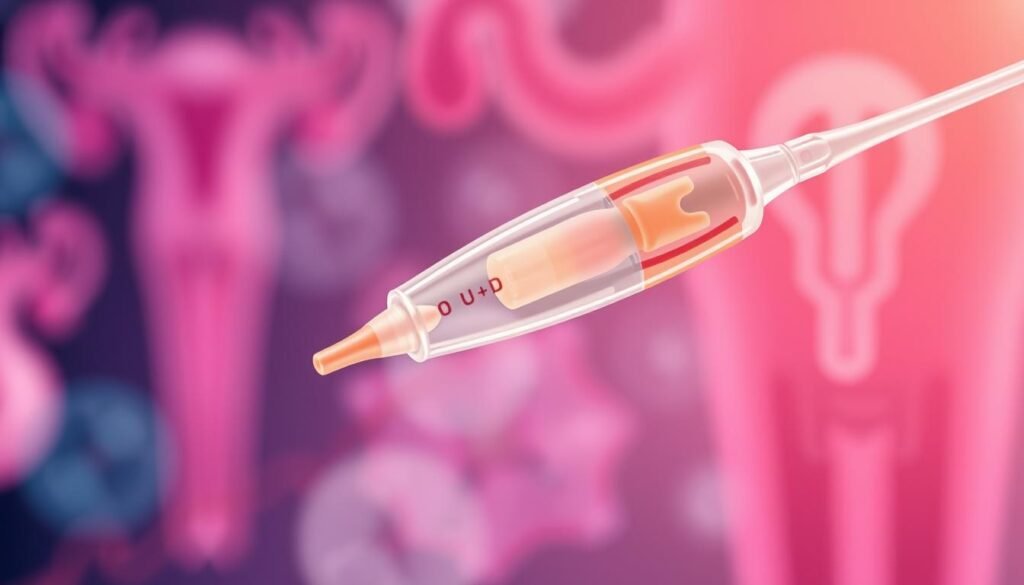Did you know between 9 to 13% of women in their fertile years are affected by PCOS? This condition brings on tough symptoms like uneven menstrual cycles, a lot of hair growth, and acne. While many opt for combined oral contraceptives (COCs) to handle these issues, some look for other options. Progestin-Only Birth Control for PCOS is crucial for those who can’t handle estrogen. It helps balance hormones and makes life better for those dealing with PCOS.
Progestin-only birth control can really help sort out menstrual problems and other PCOS symptoms. It’s important to know how these options work. And to figure out when they’re the best choice for someone with PCOS. From hormonal IUDs to mini-pills, there’s a variety of choices. These options allow for customized treatment plans focusing on a woman’s health and happiness.
For detailed info on symptom management and hormonal contraception’s role, check out this article. It covers different contraceptive choices.
Key Takeaways
- Progestin-Only Birth Control is a vital option for the 9 to 13% of women affected by PCOS.
- It can help regulate hormonal imbalances and reduce symptoms like irregular periods and acne.
- This method is ideal for individuals who cannot use combined hormonal contraceptives.
- Progestin-only options include the hormonal IUD and mini-pills, offering effective PCOS treatment.
- Understanding the benefits and potential risks of progestin-only birth control is critical for informed decision-making.
- Consultation with healthcare professionals is essential to determine the best contraceptive choice for managing PCOS.
Understanding PCOS and Hormonal Imbalances
Polycystic Ovary Syndrome (PCOS) is a major health issue for people with ovaries. It affects 5 to 10 percent of females, making it a common hormonal imbalance. This condition causes too much androgen production, which leads to symptoms that can lower quality of life.
PCOS is known for causing irregular periods, usually less than six to eight times a year. It can also make it hard to get pregnant because it messes with ovulation. Plus, it can cause acne and a lot of hair growth, which might make someone feel bad about how they look.
People with PCOS are more likely to get metabolic disorders. About 70% might have issues with insulin, which makes diabetes more likely by age 40. They also might face a greater risk of sleep apnea and fatty liver disease.
It’s also important to know about the mental health side of PCOS. Many dealing with it feel depressed or anxious. This is often due to the difficulty in handling the symptoms and concerns about fertility.
To manage PCOS, you might need to change your lifestyle or use hormonal contraceptives. These methods help control your menstrual cycle and other symptoms of the imbalance.
What is Progestin-Only Birth Control?
Progestin-Only Birth Control, commonly called the minipill, has only progestin. This is a man-made version of progesterone. It’s for women who might have issues with estrogen. So, it’s good for those with certain health problems or breastfeeding moms.
The minipill works by making cervical mucus thicker. This stops sperm. It also may stop ovulation. This greatly lowers pregnancy chances. For the best results, you must take it daily. Missing a dose can make it less effective, especially if it’s more than three hours late.
The minipill comes in 28-day packs. Taking a pill at the same time every day is important. It’s chosen by those who should avoid estrogen. This includes smokers and those with high blood pressure or clot histories.
Remember, the minipill doesn’t prevent STIs. Using condoms during sex is a good way to protect yourself.
Some might have side effects like irregular periods or headaches. Serious issues like heavy bleeding or bad stomach pain need quick attention. Knowing about the minipill helps people choose carefully based on their health.
How Progestin-Only Birth Control for PCOS Works

Progestin-only birth control is key to handling PCOS issues. It keeps hormone levels balanced by stopping ovulation. It acts like the body’s own hormones. A popular choice is the hormonal IUD, which gives progestin to the uterus.
The hormonal IUD blocks pregnancy and limits uterine lining growth. This is vital for those with irregular cycles due to PCOS. Using progestin-only options can make menstrual cycles more regular. It also helps with symptoms like high androgens.
Progestin-only birth control is good for women who can’t use estrogen. This includes those at risk for blood clots or heart issues. Without a placebo week, it keeps hormone levels stable. This might shorten periods or stop them completely.
- Prevents ovulation, thereby managing hormonal levels.
- Reduces the risk of endometrial hyperplasia.
- Enhances the predictability of menstrual cycles.
- Assists in managing weight and insulin sensitivity issues often seen in PCOS patients.
For women with PCOS, managing weight is critical. Losing just 5% of body weight can greatly reduce symptoms. Progestin-only birth control regulates hormones and aids in treating PCOS effectively.
Benefits of Progestin-Only Contraceptives

Progestin-only contraception comes with many advantages, especially for women with PCOS. It brings fewer side effects than combination pills. This makes it a good choice for those sensitive to estrogen. You can learn more about their benefits as a PCOS treatment.
These contraceptives help regularize menstrual cycles. They are helpful for women with irregular periods. Also, they can lower high androgen levels, easing acne and excess hair.
They also cut down the risk of blood clots. Since they don’t have estrogen, they are safer for women prone to blood clots. This makes them appealing to those dealing with PCOS symptoms.
Choosing the right contraception depends on your health profile. Women should talk to their doctors to find the best fit. This way, they can address their symptoms safely.
All these advantages make progestin-only contraception a valuable option. It helps many deal with PCOS and its effects.
Risks and Considerations of Progestin-Only Birth Control

Progestin-only birth control helps manage symptoms of polycystic ovary syndrome (PCOS). However, it has side effects like irregular bleeding, breast tenderness, and mood changes. It’s important for those sensitive to hormonal changes to know about these side effects.
Those with high blood pressure or heart issues should talk to their doctors before using progestin-only contraceptives. Smoking, especially in women over 35, raises the risks linked to these contraceptives, such as blood clots or worse insulin resistance. These concerns highlight the increased PCOS risks.
It’s crucial to understand the varying metabolic impacts of these contraceptives. Research shows they can affect insulin sensitivity differently in individuals, depending on factors like weight. For instance, overweight women with PCOS might not see the same decrease in male hormones as thinner women using combined oral contraceptives. This underlines the need for personalized medical advice when choosing contraceptives.
When considering hormonal treatments, assessing their overall impact on health and lifestyle is vital. Maintaining communication with healthcare providers helps navigate the risks effectively. Weighing both the positives and potential negatives enables better decision-making.
| Consideration | Implications |
|---|---|
| Irregular bleeding | May affect daily life and emotional wellbeing |
| Breast tenderness | Potential discomfort requiring management |
| Mood changes | Can influence mental health and social interactions |
| Cardiovascular issues | Higher need for monitoring and possible alternatives |
| Obesity-related factors | Different metabolic responses may necessitate tailored treatment |
Knowing about these risks and examining personal health histories help ensure safer use of progestin-only contraceptives.
Different Forms of Progestin-Only Birth Control
There are different progestin-only birth control methods. They fit various lifestyles and health needs. Options include the minipill, hormonal IUD, and the injectable Depo-Provera.
The minipill is a favorite for many. It has norethindrone and needs daily intake at the same time. This makes consistent use key. If taken right, only 2 to 3 women out of 100 will get pregnant in a year.
The hormonal IUD lasts for years. It slowly releases progestin into the uterus. This choice has a very low chance of failure. It also cuts down daily tasks.
Depo-Provera injections are another path. They require a shot every three months. This method is great for those who don’t want a daily pill.
| Method | Administration | Duration of Effectiveness |
|---|---|---|
| Minipill | Daily oral intake | Monthly |
| Hormonal IUD | Intrauterine insertion | 3 to 7 years |
| Injectable (Depo-Provera) | Intramuscular injection | 3 months |
When picking a contraceptive method, think about your lifestyle. Also, consider how often you want to manage it. Each offers a unique way to handle reproductive health.
When to Choose Progestin-Only Birth Control for PCOS
Progestin-only birth control offers a choice for those treating PCOS, especially with health concerns. If you have PCOS and can’t use estrogen, this method might be right for you. It is key for managing hormonal imbalance risks.
Breastfeeding moms might choose progestin-only birth control because it doesn’t change milk supply. To manage menstrual cycles well, tailored contraceptive advice is necessary. Speaking with healthcare experts can help shape a plan that meets your needs and health issues.
Deciding on birth control means looking at your health history, life situation, and PCOS management goals. Here’s a quick look at when progestin-only birth control could be your top pick:
| Factor | Description |
|---|---|
| Estrogen Contraindications | Those with conditions like high blood pressure or clotting issues should steer clear of estrogen. |
| Breastfeeding | For nursing moms, progestin-only choices don’t impact milk making, so they’re a good option. |
| Personal Preference | Some people want to avoid the side effects that come with combined hormonal birth control. |
| Regulation of Menstrual Cycles | These contraceptives can steady your periods without messing with androgen levels. |
| Long-term Management | For a long-lasting way to deal with PCOS symptoms, this birth control works well. |
Comparing Progestin-Only Birth Control with Combination Hormonal Contraceptives
Since 1960, over 100 million women worldwide have used Combination hormonal contraceptives (CHCs). These contraceptives combine estrogen and progestin, blocking ovulation. They help treat symptoms of PCOS. Many women prefer them for reducing acne, menstrual issues, and hirsutism. This is because they decrease androgen levels, improving skin conditions.
Progestin-only options are safer for those at risk of complications like thromboembolism. For women who react badly to estrogen, these contraceptives are a better match. Both types are effective for preventing pregnancy. Yet, people choose based on their health needs and preferences. According to an efficacy comparison, progestin-only contraceptives have fewer side effects. This makes them attractive to women wanting fewer health risks.
| Feature | Combination Hormonal Contraceptives | Progestin-Only Contraceptives |
|---|---|---|
| Components | Estrogen and progestin | Only progestin |
| Mechanism of Action | Inhibits ovulation and decreases androgen levels | Thickens cervical mucus, preventing sperm entry |
| Common Side Effects | Headaches, nausea, increased risk of clots | Irregular bleeding, breast tenderness |
| Usage Recommendations | Not advised for smokers over 35, those with a history of clots | Safer for women at risk of thromboembolism |
| Effect on Acne | Reduces acne symptoms | May worsen acne (not recommended for acne treatment) |
Choosing the right method depends on personal health situations. Talking to a healthcare provider is vital. They will help you make the best choice for managing PCOS symptoms.
Conclusion
Progestin-Only Birth Control for PCOS is a strong choice for managing symptoms. It helps balance hormones, lowers pregnancy risks, and boosts life quality for PCOS patients. Especially for those who can’t use other hormonal contraceptives, it’s a great option.
About 9-13% of women in their reproductive years have PCOS. This makes finding the right treatment urgent and necessary. Progestin-only contraceptives like the IUD or pills are good for long-term control. They also tackle issues like unwanted hair growth and irregular periods. Knowing about these options is key to making smart health choices.
It’s important to talk to a healthcare provider to get a tailored PCOS treatment plan. This plan should include birth control and lifestyle changes for the best results. Understanding your health needs leads to better and more effective treatment in battling PCOS.